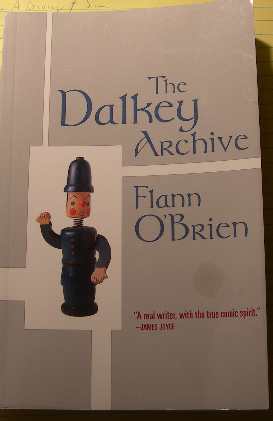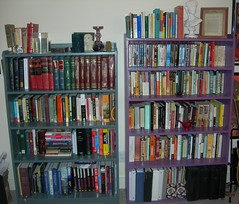by Flann O'Brien, 1964
204pp
Read: 12/30/06-01/03/07
This is probably the only book I've read with a cover blurb from James Joyce. Not about Joyce, not likening O'Brien to Joyce (though there are plenty such blurbs, most notably from Anthony Burgess), but a genuine bit of Joyceana, a quote in which Joyce himself calls O'Brien "A real writer, with the true comic spirit."
I picked up this book because I enjoyed The Third Policeman. I first heard about O'Brien in a conversation (in Dublin, June 16, 2002) in which someone said he really didn't understand why O'Brien was so frequently compared to Joyce, outside of their both being Irish. Which came to be my own opinion after reading Third Policeman. Whereas Joyce is the height of modernism, O'Brien is most definitely post-modern. While, yes, Joyce's otherwise intellectually dense writing is tempered by a sense of humor, O'Brien seemed to be going for intellectual yucks. After reading Dalkey Archive, however, it is clear: O'Brien got down on his knees & begged to be mentioned in the same breath as Joyce.
It seems to me that, whatever other experiences formed O'Brien as a writer, a sincere worship of Joyce's works was one of them. (Which, for the record, was the only rational course of action for a young writer in Ireland in the first half of the twentieth century.) O'Brien went to the same college as Joyce, having forged an interview with John Joyce for his college application. And The Dalkey Archive, set a few years after Joyce's death, features him as one of its characters, to great comic effect if you yourself happen to be a fan.
And that's what this book mostly goes for: comic effect. There's a point early on in which St. Augustine talks theology, and while that part is funny, it's especially erudite, kind of like a postmodern The Temptation of St. Anthony. I wish that O'Brien, having established a device for introducing historical personages and having offbeat conversations with them, had continued to do so. But he pretty much goes on to recycle some material from Third Policeman (though he'd written that book a couple of years earlier, it wouldn't be published until after his death, a couple of years later), throws Joyce into the mix, makes a few jokes about the Jesuit Society, and calls it quits. Smart and entertaining and quick, in equal parts, but if you've never read any O'Brien you'll want to start with The Third Policeman.

The copy I read happened to be published by "Dalkey Archive Press," which seems to be what Illinois State University chose to name its publishing arm. For some reason. Reading this book had a feeling of in some way coming full circle. The Joyce character talks about going to the Parisian bookshop of Sylvia Beach. I first bought Third Policeman at Shakespeare & Co., though that copy is now probably in Pittsburgh, I think, where I have never been. A real shame, since it was an edition you can't get in the States.

No comments:
Post a Comment